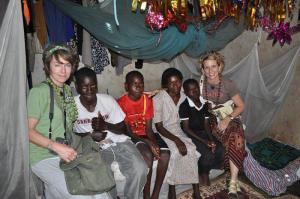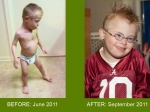A guest post, by Jenny Clark
She is four years old. Her name is Leah Grace and she is the daughter of my friend Deb (the one I just went to Africa with). She contracted HIV through no fault of her own. She takes her meds every day like a good girl. Because of those meds, and the love of her family, she is a perfectly healthy normal little girl.
While in Uganda, I wiped her snot, drank after her, shared food with her, helped her in the bathroom….all of the things I would do with my own daughter. About halfway through the week we had some friends come and stay with us for a few nights, which caused us to have to do a little shuffle of the sleeping arrangements. I am no stranger to having kids in my bed and all up in my business while I sleep, so I didn’t think twice when Leah Grace wanted to bunk with me.
But then right before I fell asleep, 1987 came back to haunt me ……for a split second.
What if she has a stomach virus and throws up on me during the night?
Is HIV present in urine? What if she wets the bed?
She got a cut on her nose today…what if it opens up while she is asleep?
The truth is sometimes ugly, and I really don’t want to admit it…..especially since I am on staff with Project Hopeful, and our whole objective is to shine light on the facts about HIV and to advocate for children who live with it.
But then I realized, that if I KNOW the facts, and 1987 still crept in to my mind for a split second, how would my friends react in the same situation? How would I have reacted a couple of years ago?
Please friends, for the sake of this sweet girl and so many others like her, educate yourself!
Here are the fact about HIV…..most of them are very straightforward and the only thing you can do with them is read/understand them and help educate others……
….but 2 of these facts are things we can CHANGE…..YOU can change….right now…..today………….can you find them? Will you?
You NEVER have to fear contracting HIV through casual contact with an HIV+ person.
HIV has NEVER been transmitted in normal family living conditions. Never.
HIV FACTS
#1: HIV is spread in three main ways: Sexual contact, IV drug use (through the sharing of dirty needles), and mother to infant (through pregnancy, birth or breast feeding).
#2: Medications called ARV’s can mean the difference between life and death. Children who receive treatment are expected to live a normal lifespan.
#3: HIV is not found in sweat, urine, feces, tears, saliva or snot. It is found in blood, semen, vaginal fluids and breast milk. While HIV may live for a short while outside of the body, HIV transmission has not been reported as a result of contact with spillages or small traces of blood, semen or other bodily fluids. This is partially because HIV dies quite quickly once exposed to the air, and also because spilled fluids would have to get into a persons bloodstream to infect them.
#4: You don’t have to fear catching HIV through day to day activities with people who are HIV+. You are free to share plates, cups, utensils, food, toilets, towels, linens and other household items without risk of transmission. –American Academy of Family Physicians
#5: Today, HIV is considered a chronic, but manageable disease, much like Type II Diabetes (though Diabetes cannot be transmitted).
#6: If a pregnant mother does not receive medical treatment, there is approximately a 30% chance she will transmit the virus to her child. By treating mother and infant, doctors can reduce that rate to approximately 1%.
#7: A persons HIV+ status is protected medical information. There are US laws in place to protect the privacy of individuals living with the virus. There are also laws to protect citizens from being discriminated against because they have HIV/AIDS should they decide to disclose their HIV status.
#8: Social stigma is perhaps the greatest challenge an HIV+ individual will face.
#9: A persons viral load is the amount of HIV found in their body. Through the use of HAART treatment it is possible for a patients viral load to become undetectable in laboratory tests. Having an undetectable viral load does not mean a person is cured. It simply means the medications are working to prevent the HIV virus from replicating within the body.
#10: In 2009 the Kaiser Family Foundation conducted a study titled “Survey of Americans about HIV/AIDS” which found that levels of knowledge about HIV/AIDS had not increased in the US since 1987.
#11: Families should use universal precautions whether or not someone in the family has HIV. Kids should be taught not to touch anyone’s blood anyway! This enables them to offer assistance to injured persons in a safe and healthy way.
#12: In the West, HIV is now considered a chronic illness rather than the terminal disease it used to be. Sadly, this isn’t the case for those children infected with HIV who are living in resource-poor settings, where 50% of infected and untreated children are not expected to live past the age of two.
#13: Today, 6,500 people will die as a result of AIDS. 6,000 of those people will leave children behind. Those children will join the already 15 million children who have lost parents to this treatable disease. (note: HIV is NOT AIDS. Patients receiving treatment for HIV (with ARV’s) can be expected to live long healthy lives without ever developing AIDS. In the U.S. ARV’s are readily available, however this is not the case in most developing parts of the world)
#14: There is no reason to fear that a mosquito or other insect could transmit HIV from one person to another through HIV-infected blood left on its mouth parts. Studies conducted by the CDC and elsewhere have shown no evidence of HIV transmission from mosquitoes or any other insects–even in areas where there are many cases of AIDS and large populations of mosquitoes. Lack of such outbreaks, despite intense efforts to detect them, supports the conclusion that HIV is not transmitted by insects.
#15: There are no documented cases of HIV being transmitted during participation in sports. The very low risk of transmission during sports participation would involve sports with direct body contact in which bleeding might be expected to occur. If someone is bleeding, their participation in the sport should be interrupted until the wound stops bleeding and is both antiseptically cleaned and securely bandaged. There is no risk of HIV transmission through sports activities where bleeding does not occur.
#16: No incident of food being contaminated with HIV-infected blood or semen has been reported to CDC. Furthermore, CDC has received no reports of HIV infection resulting from eating food, including condiments. HIV does not live long outside the body. Even if small amounts of HIV-infected blood or semen was consumed, exposure to the air, heat from cooking, and stomach acid would destroy the virus. Therefore, there is no risk of contracting HIV from eating food.
#17: Many scientific studies have been conducted to examine all the possible ways that HIV is transmitted. These studies have NOT shown HIV to be transmitted through air, water, insects, or casual contact.

 The HOPE+ sisterhood Uganda is a 6 month commitment to be a “sister” to one of these precious women. You will encourage her, pray for her and financially assist her through a $40 per month donation. This donation will be used by your sister to start a small business so that she can obtain proper nutrition (which is absolutely essential for their ARV’s to work) and care for her children.
The HOPE+ sisterhood Uganda is a 6 month commitment to be a “sister” to one of these precious women. You will encourage her, pray for her and financially assist her through a $40 per month donation. This donation will be used by your sister to start a small business so that she can obtain proper nutrition (which is absolutely essential for their ARV’s to work) and care for her children.





